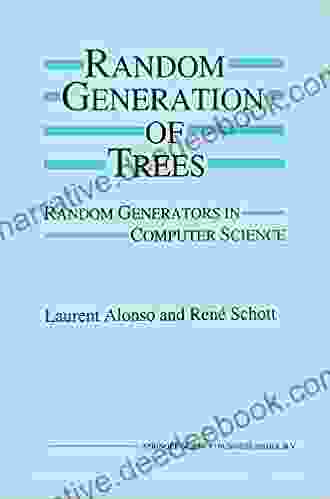A Comprehensive Exploration of Random Generators in Computer Science: Concepts, Applications, and Implementation

Random generators are essential tools in computer science, used in a wide range of applications such as cryptography, simulations, and gaming. They generate sequences of seemingly unpredictable numbers, which are crucial for security, modeling, and entertainment purposes. This article provides a comprehensive overview of random generators in computer science, covering their concepts, applications, and implementation.
Types of Random Generators
There are two main types of random generators:
4.5 out of 5
| Language | : | English |
| File size | : | 2481 KB |
| Text-to-Speech | : | Enabled |
| Screen Reader | : | Supported |
| Print length | : | 220 pages |
- Pseudo-random Generators (PRGs): PRGs generate sequences of numbers that appear random but are actually deterministic. They use mathematical formulas to generate these sequences and are widely used in computer science due to their speed and efficiency.
- True Random Generators (TRGs): TRGs generate truly random numbers based on physical phenomena, such as radioactive decay or atmospheric noise. They provide higher security and unpredictability compared to PRGs but are slower and more expensive to implement.
Concepts of Randomness
The concept of randomness is central to random generators. In computer science, randomness is measured using statistical tests that assess the distribution, independence, and unpredictability of a sequence of numbers. Common tests include:
- Chi-squared test: Measures the uniformity of distribution.
- Kolmogorov-Smirnov test: Detects deviations from a specific distribution.
- Serial correlation test: Checks for dependencies between numbers.
- Entropy test: Measures the unpredictability of numbers.
Applications of Random Generators
Random generators have numerous applications in computer science, including:
- Cryptography: Random numbers are used to generate encryption keys, initialize ciphers, and create digital signatures.
- Simulations: Random generators are used to create realistic models and simulations, such as in weather forecasting, financial markets, and drug discovery.
- Gaming: Random numbers are used to generate random events, such as dice rolls, card draws, and enemy spawns.
- Sampling: Random generators are used to select random samples from large datasets, ensuring unbiased and representative results.
- Testing: Random generators are used to create test cases and generate random data for software and hardware testing.
Implementation of Random Generators
The implementation of random generators involves choosing appropriate algorithms and data structures to generate random numbers. Common algorithms include:
- Linear Congruential Generator (LCG): A simple and widely used PRG that generates numbers based on a linear equation.
- Mersenne Twister: A fast and high-quality PRG that uses a twisted feedback shift register.
- Hardware Random Number Generator (HRNG): A TRG that generates numbers based on physical processes, such as thermal noise or quantum effects.
Challenges in Random Generation
Implementing random generators comes with several challenges:
- True Randomness: Generating truly random numbers is difficult, as computers are deterministic machines.
- Periodicity: PRGs have a limited period, after which the sequence of numbers repeats.
- Correlation: Random generators may produce correlated numbers, reducing their unpredictability.
- Security: Random numbers used in cryptography must be secure and unpredictable to prevent attacks.
Random generators are indispensable tools in computer science, enabling a wide range of applications that rely on randomness. Understanding the concepts, applications, and implementation of random generators is crucial for creating secure, reliable, and engaging systems. As technology advances, new techniques and algorithms are being developed to address the challenges associated with random number generation, ensuring that random generators continue to play a vital role in the future of computer science.
4.5 out of 5
| Language | : | English |
| File size | : | 2481 KB |
| Text-to-Speech | : | Enabled |
| Screen Reader | : | Supported |
| Print length | : | 220 pages |
Do you want to contribute by writing guest posts on this blog?
Please contact us and send us a resume of previous articles that you have written.
 Book
Book Novel
Novel Page
Page Text
Text Story
Story Genre
Genre Reader
Reader Library
Library Newspaper
Newspaper Paragraph
Paragraph Shelf
Shelf Glossary
Glossary Foreword
Foreword Synopsis
Synopsis Annotation
Annotation Footnote
Footnote Manuscript
Manuscript Scroll
Scroll Tome
Tome Biography
Biography Autobiography
Autobiography Encyclopedia
Encyclopedia Dictionary
Dictionary Narrator
Narrator Character
Character Resolution
Resolution Librarian
Librarian Card Catalog
Card Catalog Borrowing
Borrowing Study
Study Research
Research Scholarly
Scholarly Reserve
Reserve Academic
Academic Journals
Journals Special Collections
Special Collections Interlibrary
Interlibrary Study Group
Study Group Thesis
Thesis Book Club
Book Club D K Doulos
D K Doulos Alanis Morissette
Alanis Morissette Bethany Olds
Bethany Olds Jessica K Quillin
Jessica K Quillin Christopher F Small
Christopher F Small Hester Velmans
Hester Velmans Judy Harris Helm
Judy Harris Helm Sue Fox
Sue Fox Rafaela Hillerbrand
Rafaela Hillerbrand Laurent Dubois
Laurent Dubois Matthew Hoch
Matthew Hoch Rick Bragg
Rick Bragg Jorge N Ferrer
Jorge N Ferrer Geoff Shepard
Geoff Shepard Heather Gudenkauf
Heather Gudenkauf Jules Verne
Jules Verne Auberon Herbert
Auberon Herbert Peter Curtis
Peter Curtis David Lindsley
David Lindsley Christine Lohmeier
Christine Lohmeier
Light bulbAdvertise smarter! Our strategic ad space ensures maximum exposure. Reserve your spot today!

 Isaac AsimovCall Across the Sea: The Heroes Quartet - A Timeless Tale of Love, Loss, and...
Isaac AsimovCall Across the Sea: The Heroes Quartet - A Timeless Tale of Love, Loss, and...
 Avery SimmonsPatchwork Knitting: Explore the Art of Combining Squares, Shells, and Strips
Avery SimmonsPatchwork Knitting: Explore the Art of Combining Squares, Shells, and Strips Frank MitchellFollow ·19.3k
Frank MitchellFollow ·19.3k Gage HayesFollow ·8k
Gage HayesFollow ·8k W. Somerset MaughamFollow ·3.6k
W. Somerset MaughamFollow ·3.6k Jerry WardFollow ·10.8k
Jerry WardFollow ·10.8k Reed MitchellFollow ·17k
Reed MitchellFollow ·17k Cody BlairFollow ·3.3k
Cody BlairFollow ·3.3k Garrett BellFollow ·13.4k
Garrett BellFollow ·13.4k Garrett PowellFollow ·7.4k
Garrett PowellFollow ·7.4k

 Dallas Turner
Dallas TurnerParasols and Peril: Adventures in Grace
In the quaint town...

 Caleb Carter
Caleb CarterFlight Attendant Joe: A Dedicated Professional in the...
Flight Attendant Joe...

 Jerry Ward
Jerry WardPick Lottery The List For 23 States August 15 2024
The Pick Lottery is a multi-state lottery...

 Hudson Hayes
Hudson HayesHow the Media Wields Dangerous Words to Divide a Nation
In a world where the media is...

 Curtis Stewart
Curtis StewartThe Magic Mala: A Story That Changes Lives
In the realm of ancient traditions and...

 Raymond Parker
Raymond ParkerEarthly Meditations: A Poetic Tapestry of Nature,...
In the realm of contemporary...
4.5 out of 5
| Language | : | English |
| File size | : | 2481 KB |
| Text-to-Speech | : | Enabled |
| Screen Reader | : | Supported |
| Print length | : | 220 pages |








